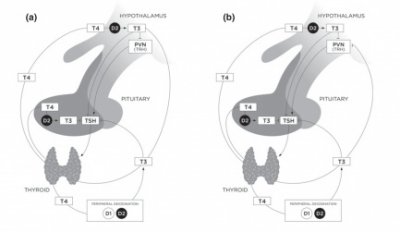Nelson Vergel
Founder, ExcelMale.com

Schematic Representation of the Feedback Mechanisms in the Hypothalamus–Pituitary–Thyroid Axis
· The thyroid gland secretes T4 and T3, the biologically active thyroid hormone; T3 is also produced outside the thyroid gland via deiodination of T4;
· T3 initiates the negative feedback at the hypothalamus and anterior pituitary gland by suppressing TRH and TSH expression and secretion, respectively;
· only about 20% of the T3 produced daily is directly secreted by the thyroid gland;
· most T3 (about 80%) is produced outside of the thyroid gland (periphery) via two deiodination pathways, D1 and D2;
· T3 from both sources mixes in the plasma, defining the pool of circulating T3; D2-generated T3 also acts locally, before exiting the cell where deiodination of T4 took place;
· this occurs in the hypothalamus and pituitary gland and explains how circulating T4 can signal the feedback mechanism;
· in the hypothalamus, D2 is expressed in specialized ependymal cells (tanycytes), whereas in the anterior pituitary gland, D2 is expressed in the TSH-producing cells, thyrotrophs;
· the current model for the feedback mechanism is depicted in (a) and predicts that plasma T3 mixes with D2-generated T3 both in the hypothalamus (to suppress TRH) and in the pituitary gland (to suppress TSH);
· the data obtained in the genetically modified mice support a new model (depicted in (b)) in which plasma and D2-generated T3 do not mix in the hypothalamus; consequently, plasma T3 can be monitored independently of circulating T4.
Triiodothyronine (T3), the active form of thyroid hormone is produced predominantly outside the thyroid parenchyma secondary to peripheral tissue deiodination of thyroxine (T4), with <20% being secreted directly from the thyroid.
In healthy individuals, plasma T3 is regulated by the negative feedback loop of the hypothalamus–pituitary–thyroid axis and by homoeostatic changes in deiodinase expression.
Therefore, with the exception of a minimal circadian rhythmicity, serum T3 levels are stable over long periods of time. Studies in rodents indicate that different levels of genetic disruption of the feedback mechanism and deiodinase system are met with increase in serum T4 and thyroid-stimulating hormone (TSH) levels, while serum T3 levels remain stable.
These findings have focused attention on serum T3 levels in patients with thyroid disease, with important clinical implications affecting therapeutic goals and choice of therapy for patients with hypothyroidism.
Although monotherapy with levothyroxine is the standard of care for hypothyroidism, not all patients normalize serum T3 levels with many advocating for combination therapy with levothyroxine and liothyronine.
The latter could be relevant for a significant number of patients that remain symptomatic on monotherapy with levothyroxine, despite normalization of serum TSH levels.
https://onlinelibrary.wiley.com/doi/10.1111/cen.12538/full
Last edited:















